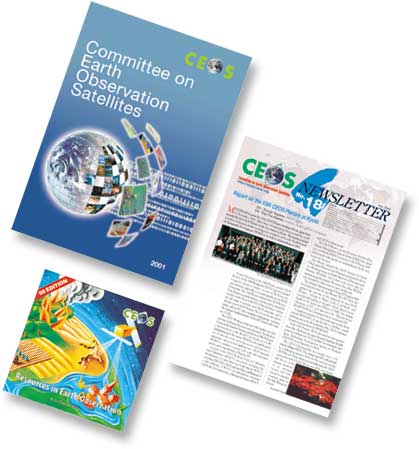 |
|||||
|
CEOS What is CEOS? CEOS is the Committee on Earth Observation Satellites, created in 1984 in response to a recommendation from a Panel of Experts on Remote Sensing from Space, under the aegis of the Economic Summit of Industrialised Nations Working Group on Growth, Technology and Employment. Since its establishment, CEOS has provided a broad framework for international coordination on spaceborne Earth observation missions.
Why coordinate Earth observation satellites? Earth observation satellites are recognised as the sole or primary source of data for a wide range of operational and commercial applications, scientific studies, and policy needs – such as in the monitoring of international environmental treaties. Part I of this document describes some examples of their importance in areas such as future management of freshwater resources, and improving understanding of the global carbon cycle. Many of the relevant issues are global in nature and require global solutions beyond the mandate and resources of individual governments. Large number of geophysical measurements are required – often with different spatial and temporal resolutions and accuracies. No single programme, agency, or nation can hope to satisfy all of the observational requirements which are necessary for improved understanding of the Earth system. CEOS was established to provide coordination of the Earth observations being provided by satellite missions. What does CEOS contribute? CEOS strives to facilitate the necessary harmonisation and achieve maximum cost-effectiveness for the total set of space-based observation programmes of member countries and agencies. CEOS has established three primary objectives in pursuing this goal:
The work of CEOS spans the full range of activities required for proper international coordination of Earth observation programmes and maximum utilisation of their data, and ranges from the development of detailed technical standards for data product exchange, through to the establishment of high level interagency agreements on common data principles for different application areas – such as global climate change and environmental monitoring. Who participates in CEOS? CEOS membership comprises most of the world’s civil agencies responsible for Earth observation satellite programmes – amounting to 23 Members in 2002. CEOS also has 20 Associates, comprising:
The full list of Members and Associates is shown in the tables below. How does CEOS operate? CEOS is managed by Plenary, at which CEOS Principals meet annually. The CEOS Plenary determines policy, reviews progress on the projects and activities being undertaken, and sets the agenda of activities for the upcoming year. The Chair of CEOS rotates at the annual Plenary. The work of CEOS is conducted within its various working groups. Coordination throughout the year is maintained through a permanent Secretariat maintained by the European Space Agency (ESA), the National Aeronautics and Space Administration (NASA) jointly with the National Oceanic and Atmospheric Administration (NOAA) of the USA, and the Ministry of Education, Culture, Sports, Science and Technology (MEXT) jointly with the National Space Development Agency of Japan (NASDA). CEOS involvement in IGOS-P The Integrated Global Observing Strategy Partnership (IGOS-P) was established in June 1998 by a formal exchange of letters among the 13 founding Partners for the definition, development and implementation of the Integrated Global Observing Strategy (IGOS). The principal objectives of the IGOS are to address how well user requirements are being met by the existing mix of observations, including those of the global observing systems, and how they could be met in the future through better integration and optimisation of remote sensing (especially space-based) and in situ systems. CEOS has embraced the concept of an IGOS as a valuable initiative which perfectly complements its own set of objectives, and which may be adopted by CEOS to derive greater benefit from operating and planned observing systems. Through working together, CEOS agencies are in a position to plan their Earth observation programmes with the minimum of unnecessary overlap and to devise joint strategies for addressing serious gaps in their observation capabilities. Strengthened links between space-based and Earth-based observing systems, and with scientific and environmental policy-making processes provide compelling motivation for CEOS to take an active role in IGOS-P activities. More information Further information on the membership, structure, activities, and achievements of CEOS is provided in annex A of this document. CEOS involvement in IGOS-P is explained in annex B. |
||||||||||||||||||||||||||||||||||||||||||||||||||||||||||||||||||||||||||||
|
||||||||||||||||||||||||||||||||||||||||||||||||||||||||||||||||||||||||||||
|
||||||||||||||||||||||||||||||||||||||||||||||||||||||||||||||||||||||||||||
|
 |
|||||||||||||||||||||||||||||||||||||||||||||||||||||||||||||||||||||||||||
